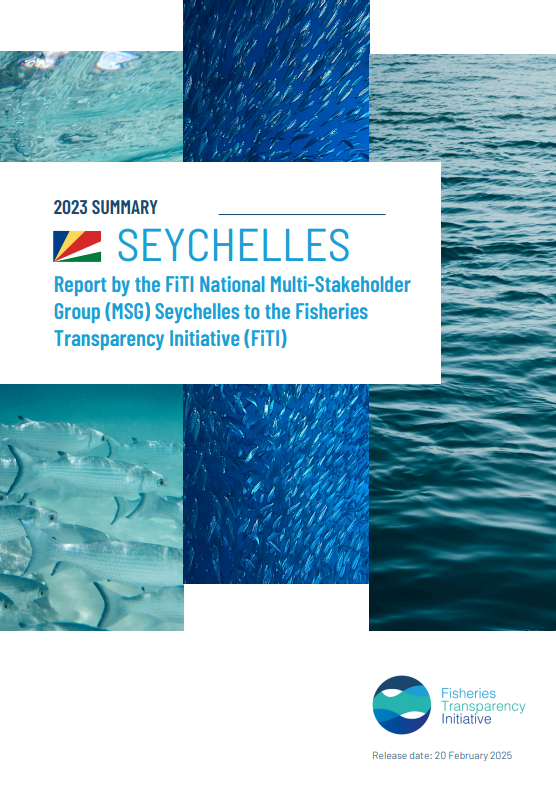Seychelles continues to enhance fisheries transparency in fifth FiTI Report

Seychelles continues be a regional leader in fisheries governance with the release of its 5th Fisheries Transparency Initiative (FiTI) Report on 28 February, 2025. This latest report showcases strides in making fisheries information more accessible, setting a high standard for transparency and accountability in the sector.
For the first time, Seychelles has published a list of fisheries offences and court cases (2020–2023) – a move that highlights the government’s commitment to accountability and deterring illegal fishing. Labour rights are now clearer too, with an official summary of national labour standards – covering both local and foreign workers, from sea-based operations to post-harvest jobs, and helping to support fair treatment across the sector.
Fisheries authorities in the Seychelles are also transforming how the public engages with fisheries information. Government websites, particularly those of the Seychelles Fisheries Authority (SFA) and the Ministry of Fisheries and Blue Economy (MFBE), are continuously updated to ensure past and present reports remain accessible.
SFA’s upgraded data systems now deliver more accurate artisanal catch data (2018–2023), and the 2023 Fisheries Bulletin offers a complete breakdown of local fishery production – including artisanal, sea cucumber, and lobster fisheries – thanks to resolved data gaps. Additionally, the quickly evolving Fisheries Information Management System (FIMS), launched in July 2023, promises to revolutionize access to fisheries data once fully operational – offering a centralized, user-friendly platform for comprehensive information on the sector.
Seychelles also completed a gap analysis on beneficial ownership in the fisheries sector, which is now publicly available. However, while a central register of beneficial owners exists, access remains restricted – but the report’s recommendations pave the way for increased accessibility. Additionally, a comprehensive Public Sector Support Report (2014-2021) reveals where subsidies and financial aid flow within the fisheries sector – a vital tool to track how public funds are supporting sustainability efforts.
The nation also continues to advance its regulatory framework, including revising the Fisheries Act and Fisheries Regulations, updating the Fisheries Sector Policy, and developing joint venture guidelines – essential steps to future-proof the sector.
However, challenges remain. The outcome of stakeholder consultations on the Fisheries Act and Fisheries Regulations is still unpublished, and labour standards for workers in the ITZ remain incomplete. Moreover, an informal fisheries sector, confirmed by MFBE, remains undocumented online.
Philippe Michaud, FiTI Lead for Seychelles, reflected on the progress made, and the challenges ahead: “This compliant status is a recognition that we are transparent in the fisheries information we provide to stakeholders and improves our reputation in the region and the world. However, this doesn’t mean that even if we have gained this status, there is [not] still work to be done. Having information is good, but it needs to be accessible and used.”
By continually improving access to data and tackling regulatory gaps, Seychelles sets a benchmark for sustainable, transparent fisheries governance. Seychelles’ leadership in enhancing fisheries management transparency emboldens other nations in the region to follow suit, supporting a more sustainable future for global fisheries.
Summary and detailed versions of the report can be found here and on the Seychelles Ministry of Fisheries and Blue Economy website.